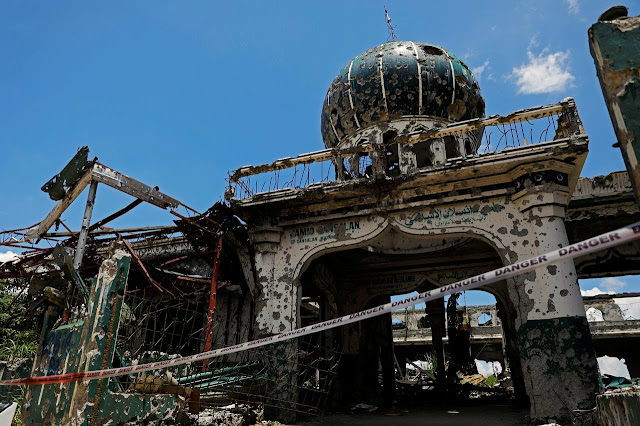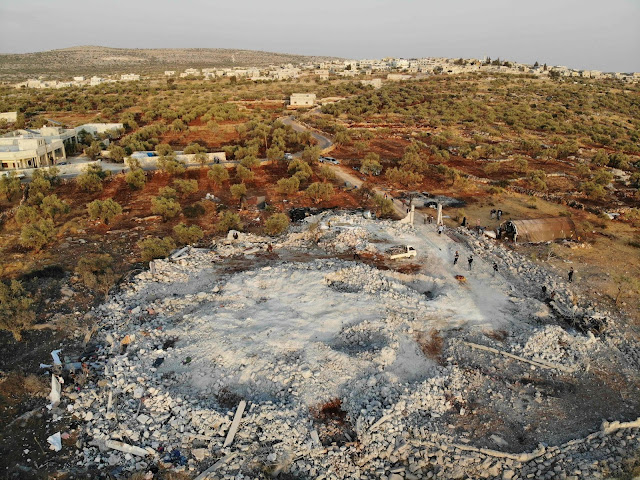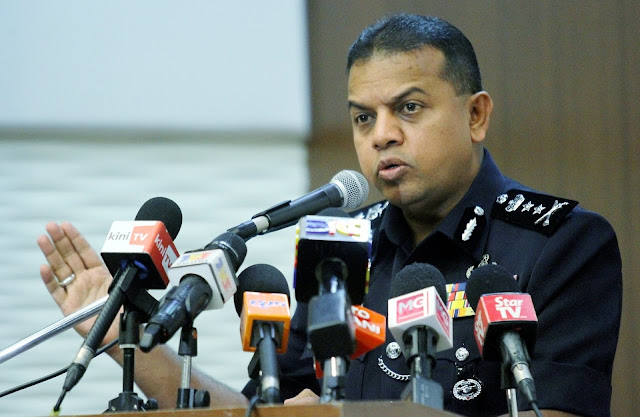After Baghdadi death, Southeast Asia expects long fight against Islamic State's influence
October 28, 2019
Martin Petty, Rozanna Latiff
MANILA/KUALA LUMPUR (Reuters) - Southeast Asian countries fighting Islamic State’s influence in the region lauded the killing of its leader Abu Bakr al-Baghdadi but said security forces were preparing for a long battle to thwart the jihadist group’s ideology.
The Philippines, Indonesia and Malaysia, home to some of Asia’s most organized Islamist militants, said on Monday they were braced for retaliation by Islamic State loyalists, including “lone wolf” attacks by locals radicalized by the group’s powerful online propaganda.
 |
| FILE PHOTO: The war-torn Grand Mosque is pictured in Marawi City, Lanao province, Philippines, May 11, 2019. REUTERS/Eloisa Lopez/File Photo |
Baghdadi killed himself in a tunnel in northwest Syria by detonating a suicide vest as U.S. forces closed in, according to U.S. President Donald Trump.
Though his death will unsettle Islamic State, it remains capable and dangerous, said Delfin Lorenzana, defense secretary of the Philippines, where the group’s influence has taken a hold among unschooled Muslim youth in its troubled Mindanao region.
“This is a blow to the organization considering al-Baghdadi’s stature as a leader. But this is just a momentary setback considering the depth and reach of the organization worldwide,” Lorenzana said. “Somebody will take his place.”
Southeast Asia has long been an important focus for Islamic State, which has inspired Islamist militants in West Africa, across the Middle East and Asia and through to Indonesia and the Philippines.
The Philippines, Malaysia and Indonesia are concerned Islamic State supporters from the region and those fleeing Iraq and Syria could exploit the porous borders, lawlessness and abundant arms found in Mindanao to take refuge in its far-flung villages.
Islamic State has claimed responsibility for four suicide bombings since July last year in the Philippines, which fought its toughest battle since World War Two in 2017 when extremists seeking to establish an Islamic State laid siege to Marawi City and occupied it through five months of air and ground assaults.
Fighters from at least seven countries took part, including Malaysia, which remains on high alert and has arrested 400 people suspected of links to militant groups.
Malaysian police counter-terrorism chief Ayob Khan Mydin Pitchay said the real concern was not Islamic State’s leadership but the effect of its teachings.
“It’s good news, but his death will have little impact here as the main problem remains the spread of the Islamic State ideology,” he told Reuters.
“What we are most worried about now are ‘lone wolf’ attacks and those who are self-radicalized through the internet. We are still seeing the spread of IS teachings online. IS publications and magazines from years ago are being reproduced and re-shared,” he said.
‘JIHAD WILL NEVER STOP’
Chatrooms in messaging applications used by Islamists such as Telegram showed defiant messages about Baghdadi’s death, according to a researcher who monitors activity by Islamic State sympathizers.
“God Willing, whatever happens, Islamic jihad will not rely on anyone individual, but will always stand tall on the orders of God and His Prophet,” read one posting under the handle Ansurul Ummah.
Another participant, Abu Abdullah Asy Syami, posted: “Jihad will never stop, even if our own caliph dies.”
Australian Prime Minister Scott Morrison made a similar observation and said Baghdadi’s death was by no means the end.
“This is a many-headed monster ... As you cut one off, another one inevitably arises,” he told reporters.
Indonesia, the world’s biggest Muslim-majority country, is grappling with a resurgence in militancy and has detained hundreds of suspects this year under tightened anti-terrorism laws.
Authorities believe thousands of Indonesians draw inspiration from Islamic State and about 500 are thought to have joined the group in Syria.
Indonesia’s intelligence agency said it was ready for retaliation and though Baghdadi’s death would be a psychological blow, Islamic State would have a successor in place.
“It is a war. Usually, there must be a counterattack or the like. When it comes to security, we are sure that we will secure this country,” said its spokesman, Wawan Purwanto.
 |
| FILE PHOTO: Dilapidated structures are seen at the most affected war-torn area of Marawi City, Lanao del Sur province, Philippines, May 11, 2019. REUTERS/Eloisa Lopez/File Photo |
“Pro-ISIS groups in the Philippines will surely re-examine their roles in the post-Baghdadi era,” he said.
Reporting by Rozanna Latiff in Kuala Lumpur, Tom Allard and Agustinus Beo Da Costa in Jakarta, John Mair in Sydney and Martin Petty and Neil Jerome Morales in Manila; Editing by David Clarke
Our Standards: The Thomson Reuters Trust Principles.
- Reuters
- https://www.reuters.com/article/us-mideast-crisis-baghdadi-asia/after-baghdadi-death-southeast-asia-expects-long-fight-against-islamic-states-influence-idUSKBN1X70S9




ISIS confirms death of Abu Bakr al-Baghdadi, announces new leader
ReplyDeleteBy Conor Finnegan October 31, 2019.
ISIS has confirmed the death of its leader Abu Bakr al-Baghdadi on Thursday, four days after President Donald Trump said the terror chief killed himself in a suicide explosion during a U.S. raid to capture or kill him on Saturday.
But the terror group, which has lost territory the size of Britain to a global coalition led by the U.S., warns that its reach across the world will expand under a new leader, identified as Abu Ibrahim al Hashimi al Qurashi.
The message, from the terror group's new spokesperson Abu Hamza al Qurayshi, also confirms the death of Baghdadi's right-hand adviser and ISIS spokesperson Abu Hassan al-Muhajir, who was killed in a U.S. airstrike Sunday in Syria near the Turkish border, according to a senior State Department official.
The death of the infamous leader, who attracted tens of thousands of fighters to the "caliphate" in Iraq and Syria, has been heralded by the Trump administration as a significant blow for ISIS, but the message says the group "stands at the threshold of Europe and Central Africa.... It is expanding and remaining, with permission from Allah, from the east to the west."
The speech provides little information about the new leader or spokesperson, with both names actually noms de guerre that mask their real identity, but tie them to the Quraysh tribe, a historic Arab tribe based near Islam's holy city Mecca. Doing so is a way to create legitimacy for their leadership because the prophet Muhammad is said to be from the Quraysh tribe.
The leadership council of ISIS "convened immediately" after Baghdadi's death and agreed to pledge allegiance to al Hashimi, who is described as an experienced and battle-hardened commander, a "scholar of its scholars," and devout cleric, according to a translation by SITE Intel Group.
Al Hashimi is also identified as a "caliph" -- meaning the group still considers itself a caliphate despite its loss of territory. Pledges to the new leader have come in across social media, according to analysts, who have warned that the terror group has fierce affiliates in West Africa, the Middle East, South Asia, and even Southeast Asia.
"Do not be happy O America, for the death of Sheikh al-Baghdadi, and do not forget the cups of death at his hands," Abu Hamza warns, adding in a shot at Trump: "Do you not look how at how you have become the joke of the nations, your fate controlled by a stupid old man, who goes to sleep with one opinion and wakes up with another?"
There are also some 10,000 fighters still detained in prisons guarded by Syrian Kurdish forces allied with the U.S. in Syria. The security of those prisons is tenuous, with over 100 of them escaping in recent weeks after Turkey's offensive against the Kurds and U.S. officials warning for months that something must be done to repatriate fighters to their home countries and deal with the majority -- 8,000 or so -- that are from Iraq and Syria.
Neither the White House nor the State Department has responded to questions about the message.
"We killed the last murderous bastard who ran ISIS. Let's go get the next one," said Sen. Ben Sasse, R-Neb., in a brief statement.
- ABC
- https://abcnews.go.com/Politics/isis-confirms-death-abu-bakr-al-baghdadi-announces/story?id=66668256&cid=social_fb_abcn